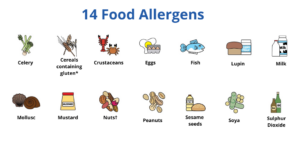Editorials
Why are Food Products with Mislabelled Allergens Still on the Shelf?
Food recalls due to allergen mislabelling are still very common in the UK. Food Standard Agency data shows that 314 allergy alerts were issued in the reporting period for 2022/23.
The consequence of food recalls not only leads to tragic loss of life, but also causes serious damage to the brand’s financial health. Pret a Manger set aside £10m to cover legal costs after Natasha Ednan-Laperouse died from consuming mislabelled baguettes in 2016 and Celia Marsh suffered from a fatal reaction to a ‘vegan’ wrap in 2017.
Around two million people in the UK are thought to live with food allergies. It’s the manufacturers’ responsibility to ensure correct allergen labelling. During the production process, checks need to be made vigilantly and diligently throughout the supply chain, in order to ensure that all goods are clearly marked, especially where allergen content is involved.
What Allergen Information Needs to Be on the Label?
Where a food product contains allergens, the allergen information must be listed and highlighted using a different font, style, background colour, or by emboldening the text. Manufacturers should also list them in the ingredients list.
There are 14 allergens in the group including celery, cereals, crustaceans, eggs, fish, lupin, milk, mollusc, mustard, peanuts, sesame seeds, soya, sulphur dioxide and tree nuts (Food Standard Agency).
The UK has implemented Natasha’s Law and Regulation (EU) 1169/2011 to prevent further fatal issues occurring from food allergy mislabelling and to ensure that all food and drink manufacturers follow the allergen labelling instructions.
However, there are still many incorrectly labelled allergen products on the shelves. Unilever recalled Viennetta Vanilla because milk and soy were not displayed in English on the label. Origin Kitchen recalled all Spread & Stir and Bessert products because peanut were not mentioned on the label.

Why do Mislabelled Food Products Still Exist in Retail?
Whilst efforts are made to ensure allergens are properly labelled, there may be instances where food and drink manufacturers are not fully aware of the allergen labelling guidance or overlook potential allergens in their products.
Besides, some manufacturers are aware of the regulations, but don’t want to invest further in ensuring correct allergen labelling. Faced with the dilemma of rising input prices, such as raw materials, energy prices, and increased labour rates, and with little or no opportunity to pass on these rising costs to their supermarket customers, some manufacturers may choose to ‘hope for the best’, rather than solve the root cause of mislabelling. Hope is not a strategy.
Other manufacturers have integrated solutions to ensure correct labelling, but these solutions are not always effective. One example of this is that a few factories have set up print rooms to ensure accurate labelling.
On one hand, whilst a print room in a factory can certainly produce labels with accurate information, it cannot be solely responsible for ensuring that products are accurately labelled (that the right label goes on the right product), as workers may overlook allergens or ingredients. On the other hand, the print room may not have access to all the necessary information. If a supplier fails to provide accurate information about the ingredients in a particular product, the labels produced by the print room may not be accurate.

How to Ensure Accurate Allergen Control?
From raw materials to finished products, it’s the manufacturers’ responsibility to ensure allergen control and provide clear and safe products to retailers and consumers. Allergen control must include but is not restricted to:
- Supplier verification: Verify that suppliers provide accurate information about allergens present in their ingredients and adhere to appropriate safety standards.
- Allergen testing: Implement regular testing of both ingredients and finished products to verify the absence of allergens and detect any contamination. This can include laboratory testing as well as on-site testing methods such as allergen swabbing.
- Accurate labelling: Review and improve their labelling and inspection procedures regarding allergen declarations to ensure clear and accurate labelling of all known allergen ingredients. Instead of having a label print room, it would be safer and more efficient to install integrated coding and labelling systems within the production lines. This can help ensure that the correct label is attached to the right product.
Harford Autocoding: 100% Verification of Packaging Accuracy
Harford Autocoding Solutions help manufacturers ensure 100% verification of packaging accuracy, to avoid inaccurate label information and unnecessary wastage. The solutions can be integrated into production lines to send real-time actionable data directly to those who need it. At the start of each production run, the system will ensure that label printers are set up accurately and in-line barcode scanners are configured to check that the correct packaging materials and labels are used – on each individual product, case or pallet. In some instances, on-line integrated cameras may also be required to ensure that the pre-printed packaging displays the correctly highlighted allergens.

Though this is a huge, essential step towards ensuring compliance, it must also be said that no automated system can ever guarantee total compliance, and full training and operator engagement are also essential to provide world class due diligence.
Harford have enormous experience in helping food and drink manufacturers ensure greater accuracy of labelling for control of allergens, date coding, quality and much more – thus giving manufacturers greater confidence in the labelling of their packages and products. If you are ready to eliminate risk and improve labelling accuracy using Harford Autocoding, please reach out to us at info@harfordcontrol.com or give us a call on +44 (0)1225 764461.
Share your thoughts to Info@harfordcontrol.com or give us a call on +44 (0) 1225 764461




